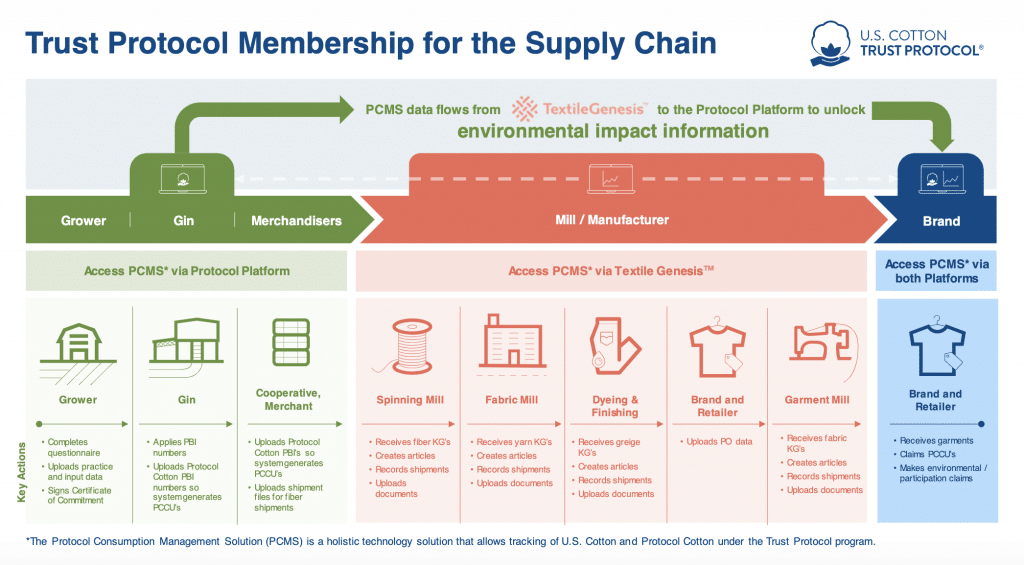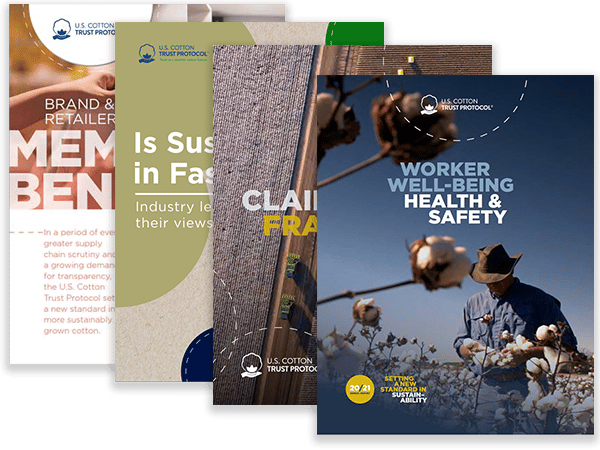Brands and Retailers
In a period of ever greater supply chain scrutiny and a growing demand for transparency, the U.S. Cotton Trust Protocol sets a new standard in more sustainably grown cotton.
Membership in the Trust Protocol will provide brands and retailers with:
Traceability:
- Opportunity to claim Protocol Consumption Units through the PCMS
- Article-level full supply chain transparency
Environmental Data:
- Quantifiable, verifiable data against science-based goals for sustainably grown cotton
- Ability to demonstrate commitment to continuous improvement regarding environmental impact
- Member Data Report in addition to the program’s Annual Report
Communications:
- Toolkit for communications, storytelling and marketing
- Opportunity to hear from experts within sustainable agriculture and cotton production
- Membership showcased on Trust Protocol website and within communications about the program, including on social
- Option to participate in strategic external communication opportunities
Benefits
- Turnkey, transparent pricing structure with no additional fees
- Includes use of TextileGenesis system and Protocol Platform as well as the scaling phase **
- Membership fee based on company annual revenue
- Consumption fee based on rate determined by the member’s forecasted consumption for the current Protocol Year. Reviewed quarterly
- Streamlined pricing structure and single market will most likely mean lower costs than any other cotton sustainability program

The Protocol Consumption Management Solution (PCMS) is our traceability and transparency solution that allows the tracking of U.S. Cotton and cotton specifically grown on Protocol producers’ farms.
The result for brand and retailer members complete visibility of each stage of production, as well as absolute validation of the origin of the cotton fiber tracked into their finished products.
Member Pricing Structure
The U.S. Cotton Trust Protocol’s pricing structure for brands and retailers covers program membership and consumption of cotton tracked through the Protocol Consumption Management Solution (PCMS) at a rate determined by the member’s forecasted consumption for the current Protocol Year.* It is a turnkey, transparent pricing structure with no additional fees.
Fees cover program administration and infrastructure with the aim of providing distributions back to Trust Protocol grower members.
Fee Pricing Structure
Fees are based on an annual membership fee* and a volume-based system for claiming Protocol Consumption Units.
Less than
$10 Million
Company Annual Revenues
$10 to
< $50 Million
Company Annual Revenues
$50 to
< $100 Million
Company Annual Revenues
$100 Million
& Greater
Company Annual Revenues
Cost Consumption Structure
| Annual Cotton Consumption (MT) | < 35% | 36 to 70% | 71 to 99% | 100% |
|---|---|---|---|---|
| < 5,000 | $8.50 | $8.00 | $7.25 | $6.50 |
| 5,000 to 20,000 | $7.50 | $7.00 | $6.25 | $5.50 |
| 20,001 to 50,000 | $6.50 | $6.00 | $5.25 | $4.50 |
| 50,001 to 100,000 | $5.25 | $4.75 | $4.00 | $3.50 |
| > 100,000 | $4.00 | $3.50 | $2.75 | $2.25 |
*Cotton tracked through the PCMS includes both Protocol Cotton and U.S. Cotton.
** Pilot phase fees are covered by the program.
The Climate Smart Cotton Program, led by the Trust Protocol, is a 5-year initiative aimed at improving the carbon footprint of the U.S. cotton industry. For brands and retailers, the program will support efforts to reduce GHG emissions and allow reporting against Scope 3 emissions reductions for cotton used in products. Click here to learn more.
oUR pARTNERS
We are proud to work with the following members.


